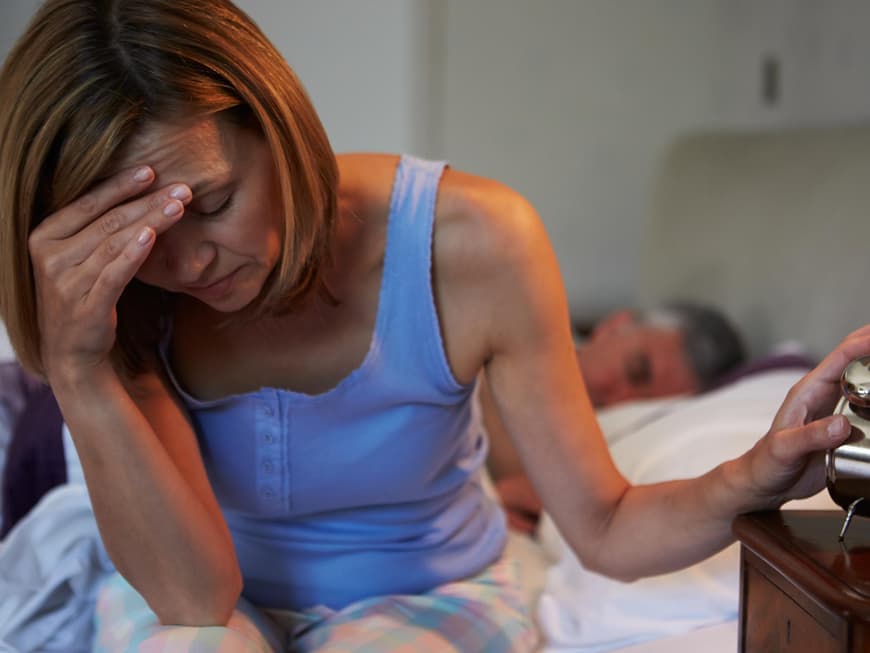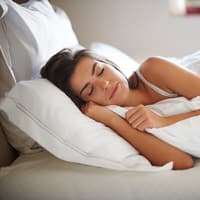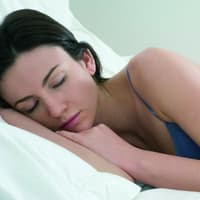
The menopause is not a disease - but its symptoms can unfortunately be very unpleasant. Women find sleep disorders and tiredness during the menopause particularly stressful. Those affected often wake up in the middle of the night and are then unable to fall asleep again for hours. During the day, they feel exhausted. Dr. Sheila de Liz explains what you can do about it.
What to do about sleep disorders during the menopause?
Interview with Dr. Sheila de Liz, gynaecologist from Wiesbaden
What is the cause of insomnia?
"During the menopause, the quality of the eggs in the ovaries decreases over time and ovulation no longer takes place regularly. As a result, the hormonal cycle is disrupted and hormone levels fall. The first hormone to become deficient is usually progesterone. Progesterone is our relaxation hormone, and if it is lacking or irregularly produced, this affects the quality of sleep. Women can then typically fall asleep relatively well at first, but are then awake from three or four o'clock at night and brood over little things or problems."
What can you do about this?
"Any form of exercise and avoiding alcohol can help. However, you shouldn't exercise too late in the evening, otherwise you're more likely to be exhilarated. I recommend at least three hours between exercise and bedtime. Yoga is an exception, as there are also special exercises for falling asleep. But if you want to get rid of the problem quickly, I recommend bioidentical progesterone. This is available in capsule or cream form and is applied in the evening."
Does the insomnia stop on its own?
"At some point, the symptoms will actually stop, but it can take a while - we're talking about the menopause and not the months of menopause."
What happens if I don't do anything?
"If you don't address your sleep problems, your quality of life suffers. Everyday life becomes more stressful, the quality of your work suffers and people close to you also notice."
Should I have my hormone status measured by a doctor?
"That's not absolutely necessary, as a hormone level can only ever be a snapshot, and the health insurance won't pay for it. It makes more sense to start a therapy and then see how you are doing after a short time. In addition to exercise and a good diet, hormone therapy is one of the pillars for getting insomnia under control. It is estimated that 60 percent of women have insomnia during the menopause."
Why do women start snoring now?
"Due to weight gain during this time. You should also check your thyroid. This is because an underactive thyroid often occurs during the menopause."
Tip: Siberian rhubarb is one of the so-called herbal hormones. Extracts help against hot flushes, for example.
New findings on hormone therapy
A fountain of youth for women - or the cause of cancer, heart attacks, thromboses and pulmonary embolisms? In recent years and decades, hardly any other topic has caused as much controversy as hormone therapy for women going through the menopause. In 2002, a study involving 160,000 American women was terminated prematurely because it became increasingly clear that hormones taken during the menopause were doing more harm than good.
Cancer and heart attacks
In recent years, however, further studies have largely given the all-clear: There is no overall increase in mortality among women who have taken hormones, nor is there an increase in mortality from cancer, heart attacks, thromboses and embolisms. This long-term study with 27,000 women ran for 18 years.
Short-term help
Of course, this is not a license to take hormones just to prevent diseases such as heart attacks or osteoporosis, doctors warn. But if a woman suffers from severe menopausal symptoms such as hot flushes, insomnia and mood swings, then hormones can help in the short term. The emphasis here is on short-term.
Not for prevention
Other studies clearly show that the risk of a heart attack increases from two women per thousand to three to seven per thousand in women who take hormones for a year or longer. The risk of thrombosis increases from two per thousand women to four to eleven per thousand. Prolonged hormone use also increases the risk of stroke, breast cancer, gallbladder disease and lung cancer. From the age of 65, women are more likely to develop dementia.
Alleviating symptoms
The conclusion drawn by the doctors: Hormone therapies are harmful in the long term; they can increase the risk of many diseases such as cancer and heart attacks. However, short-term administration can alleviate agonizing menopausal symptoms such as insomnia or hot flushes. Hormones are available as capsules, gels, patches, creams or sprays.
The three phases of the menopause
Premenopause: First symptoms: Bleeding disorders, ovulation often fails to occur, fertility decreases. The premenopause usually lasts from the age of 40 to 45.
Perimenopause: It begins one to two years before the menopause (last menstrual period). The falling oestrogen level causes typical menopausal symptoms.
Postmenopause: This begins after the menopause and lasts around ten years. The hormones gradually level out again. At around 65, the symptoms have disappeared.





